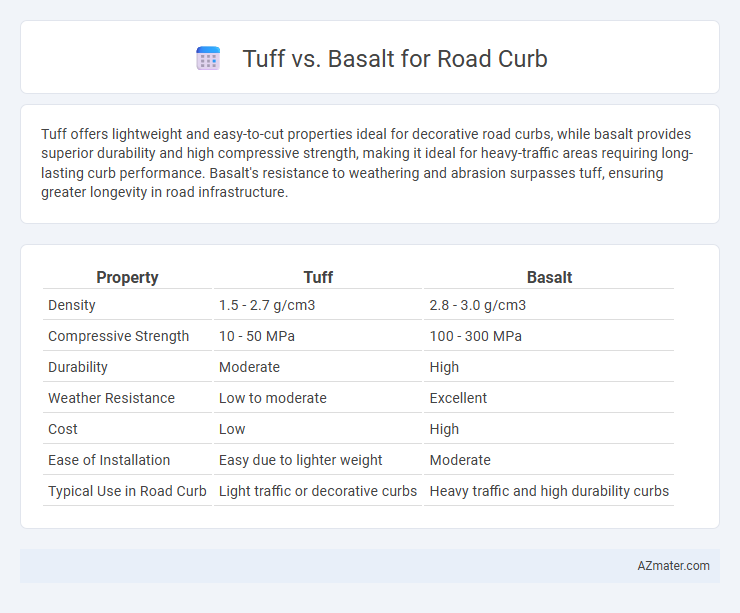Tuff offers lightweight and easy-to-cut properties ideal for decorative road curbs, while basalt provides superior durability and high compressive strength, making it ideal for heavy-traffic areas requiring long-lasting curb performance. Basalt's resistance to weathering and abrasion surpasses tuff, ensuring greater longevity in road infrastructure.
Table of Comparison
| Property | Tuff | Basalt |
|---|---|---|
| Density | 1.5 - 2.7 g/cm3 | 2.8 - 3.0 g/cm3 |
| Compressive Strength | 10 - 50 MPa | 100 - 300 MPa |
| Durability | Moderate | High |
| Weather Resistance | Low to moderate | Excellent |
| Cost | Low | High |
| Ease of Installation | Easy due to lighter weight | Moderate |
| Typical Use in Road Curb | Light traffic or decorative curbs | Heavy traffic and high durability curbs |
Introduction to Tuff and Basalt
Tuff, a porous volcanic rock formed from consolidated volcanic ash, offers lightweight properties and ease of cutting, making it suitable for road curbs requiring moderate strength. Basalt, an igneous rock formed from rapid cooling of lava, provides exceptional hardness and durability, ideal for heavy-traffic road curbs demanding high resistance to wear and pressure. Comparing Tuff and Basalt highlights a balance between lightweight workability and long-lasting strength in curb material selection.
Geological Formation and Composition
Tuff and basalt differ significantly in geological formation and composition, influencing their suitability for road curbs. Tuff is a volcanic rock formed from consolidated volcanic ash, characterized by its porous texture and relatively lower density, primarily composed of volcanic glass and fine mineral particles. Basalt, an igneous rock formed from the rapid cooling of basaltic lava, has a dense, fine-grained texture rich in iron and magnesium minerals, providing superior durability and strength for road curb applications.
Physical Properties Comparison
Tuff exhibits lower density and compressive strength compared to basalt, making it less durable for high-impact road curb applications. Basalt's high hardness and resistance to abrasion ensure superior wear performance and longevity under heavy traffic conditions. The greater toughness and weather resistance of basalt provide enhanced stability and reduced maintenance for road curbs exposed to harsh environmental factors.
Durability and Weather Resistance
Tuff and basalt are commonly used materials for road curbs, with basalt exhibiting superior durability due to its dense, hard composition that resists cracking and chipping under heavy traffic loads. Basalt's mineral structure provides excellent weather resistance, thriving in freeze-thaw cycles and resisting erosion from rain and salt corrosion better than tuff. Although tuff is lighter and easier to work with, its porous nature makes it less durable and more susceptible to weather-related degradation over time.
Load-Bearing Capacity for Road Curbs
Basalt offers superior load-bearing capacity for road curbs due to its high compressive strength, typically ranging between 100 to 300 MPa, making it ideal for heavy traffic conditions. Tuff, being a softer volcanic rock with lower density and compressive strength (generally under 50 MPa), is less suited to withstand significant loads and may deteriorate faster under stress. Choosing basalt ensures higher durability and structural integrity for road curbs subjected to frequent and heavy vehicular impact.
Workability and Installation Process
Tuff offers superior workability for road curbs due to its softer texture, allowing easier cutting and shaping during installation compared to basalt. Basalt, being a dense and hard volcanic rock, demands more advanced tools and labor-intensive processes, increasing installation time and costs. The smoother installation process with tuff often results in faster project completion and reduced labor expenses.
Aesthetic Appeal and Color Variations
Tuff offers a natural, earthy aesthetic with soft, warm tones ranging from beige to light brown, ideal for creating a subtle yet visually appealing road curb. Basalt provides a sleek, modern look with its dark gray to black coloration, adding a bold and dramatic contrast to urban landscapes. Both materials present diverse color variations, but basalt's consistent dark hues enhance contemporary designs, while tuff's varied warm shades complement rustic or traditional settings.
Cost Comparison and Availability
Tuff offers a cost-effective option for road curbs due to its abundant availability and lower quarrying expenses compared to basalt. Basalt, while more durable and wear-resistant, typically comes with higher extraction and transportation costs, impacting overall project budgets. Availability of tuff in regions with volcanic activity ensures reduced supply chain delays, whereas basalt's limited sourcing can lead to increased lead times and pricing variations.
Environmental Impact and Sustainability
Tuff offers a lower environmental impact compared to basalt due to its softer composition, requiring less energy-intensive extraction and processing methods. Basalt, while more durable, involves higher carbon emissions during quarrying and transportation because of its density and hardness. Sustainable road curb projects favor tuff for its reduced resource consumption and potential for recycling, aligning with eco-friendly infrastructure goals.
Best Applications for Tuff and Basalt in Road Infrastructure
Tuff, characterized by its lightweight and high porosity, is best suited for road curbs in areas requiring efficient drainage and reduced structural load, such as urban streets and pedestrian zones. Basalt's high density, durability, and resistance to abrasion make it ideal for heavy-traffic road curbs and highway barriers where long-lasting strength and impact resistance are critical. Selecting Tuff or Basalt for road curbs depends on balancing load requirements, environmental conditions, and maintenance priorities in road infrastructure projects.

Infographic: Tuff vs Basalt for Road Curb
 azmater.com
azmater.com